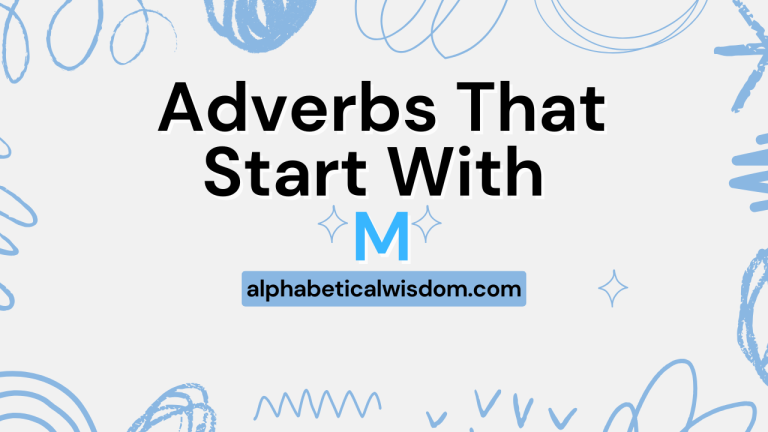Adverbs Starting With E: Enhance Your English Grammar Skills
Adverbs are essential components of the English language, enriching sentences by providing details about verbs, adjectives, or other adverbs. Understanding adverbs, especially those starting with the letter “E,” can significantly improve your writing and speaking skills.
This article offers a comprehensive guide to adverbs beginning with “E,” covering their definitions, types, usage rules, common mistakes, and practice exercises. Whether you’re a beginner or an advanced learner, this guide will help you master these adverbs and use them effectively.
Table of Contents
- Introduction
- Definition of Adverbs
- Structural Breakdown
- Types and Categories of Adverbs Starting With E
- Examples of Adverbs Starting With E
- Usage Rules
- Common Mistakes
- Practice Exercises
- Advanced Topics
- FAQ
- Conclusion
Definition of Adverbs
An adverb is a word that modifies a verb, an adjective, another adverb, a phrase, or a clause. Adverbs provide information about how, when, where, to what extent, or how often something is done or happens. They add detail and precision to sentences, making them more descriptive and engaging. Adverbs play a crucial role in conveying nuances and enriching the meaning of any given text.
Adverbs can be classified based on their function within a sentence. Common categories include adverbs of manner, time, place, degree, and frequency.
Each type serves a distinct purpose in modifying different parts of speech and adding specific details to the sentence. For example, an adverb of manner describes how an action is performed, while an adverb of time indicates when an action occurs.
Understanding the function and classification of adverbs is essential for using them correctly and effectively. By recognizing the different types of adverbs and their roles in modifying other elements of a sentence, you can improve your writing and communication skills.
This knowledge allows you to express yourself more precisely and create more vivid and engaging content.
Structural Breakdown
The structure of adverbs can vary. Many adverbs are formed by adding the suffix “-ly” to an adjective (e.g., easy becomes easily). However, not all adverbs end in “-ly,” and not all words ending in “-ly” are adverbs. Some adverbs are single words (e.g., ever, early), while others are phrases (e.g., in earnest, at ease). Understanding these structural elements can help you identify and use adverbs correctly.
Adverbial phrases often consist of a preposition followed by a noun or pronoun (e.g., in the morning, at the park). These phrases function as adverbs by providing information about time, place, or manner. Recognizing adverbial phrases is important for understanding how adverbs can be expressed in different forms and structures.
The position of an adverb in a sentence can also affect its meaning and emphasis. Adverbs can appear at the beginning, middle, or end of a sentence, depending on the intended effect.
For example, placing an adverb at the beginning of a sentence can add emphasis or create a specific tone. Understanding the flexibility of adverb placement is crucial for effective communication.
Types and Categories of Adverbs Starting With E
Adverbs starting with “E” can be categorized into several types based on their function. These include adverbs of manner, time, degree, place, and frequency.
Each category serves a distinct purpose in modifying verbs, adjectives, or other adverbs, adding specific details to the sentence.
Adverbs of Manner
Adverbs of manner describe how an action is performed. These adverbs often modify verbs and provide details about the way in which something is done. Common examples include easily, elegantly, and erratically.
Adverbs of Time
Adverbs of time indicate when an action occurs. They provide information about the timing or duration of an event. Examples of adverbs of time starting with “E” include early, eventually, and eternally.
Adverbs of Degree
Adverbs of degree express the intensity or extent of an action or quality. They modify adjectives, verbs, or other adverbs to indicate the level or degree to which something is done. Examples include especially, entirely, and exceedingly.
Adverbs of Place
Adverbs of place specify where an action takes place. While less common with the letter “E,” some adverbs can imply a location or direction. Examples might include phrases or constructions using “elsewhere” indirectly.
Adverbs of Frequency
Adverbs of frequency indicate how often an action occurs. While not typically starting with “E,” understanding frequency is important in the broader context of adverbs. Examples include everyday (used adjectivally, but implying frequency) and could be conceptually linked to adverbs like evenly distributed, suggesting a regular occurrence across a space.
Examples of Adverbs Starting With E
Here are several examples of adverbs starting with “E,” categorized by their type. These examples illustrate how each adverb is used in a sentence to modify different parts of speech and add specific details.
The following table provides examples of adverbs of manner starting with the letter “E”. These adverbs describe how an action is performed.
The table includes the adverb, an example sentence, and an explanation of the adverb’s meaning in the sentence.
| Adverb of Manner | Example Sentence | Explanation |
|---|---|---|
| Easily | She easily solved the math problem. | Describes how she solved the problem – without difficulty. |
| Elegantly | The dancer moved elegantly across the stage. | Describes the gracefulness of the dancer’s movement. |
| Erroneously | The information was erroneously reported in the news. | Indicates that the information was reported incorrectly. |
| Earnestly | He spoke earnestly about his goals. | Describes the sincerity and seriousness of his speech. |
| Evenly | The paint was spread evenly across the wall. | Describes how the paint was distributed uniformly. |
| Excitedly | The children ran excitedly to the park. | Describes the enthusiastic manner in which the children ran. |
| Exuberantly | The crowd cheered exuberantly after the goal. | Describes the lively and enthusiastic cheering of the crowd. |
| Efficiently | The team worked efficiently to complete the project. | Describes the effective and productive manner of the team’s work. |
| Elaborately | The cake was decorated elaborately with intricate designs. | Describes the detailed and ornate decoration of the cake. |
| Emotionally | She reacted emotionally to the news. | Describes the display of strong feelings in her reaction. |
| Empathetically | He listened empathetically to her problems. | Describes the understanding and compassionate way he listened. |
| Energetically | The dog barked energetically at the mailman. | Describes the high-spirited and lively barking of the dog. |
| Enthusiastically | The students participated enthusiastically in the class discussion. | Describes the eager and passionate involvement in the discussion. |
| Equally | The tasks were divided equally among the team members. | Describes the fair and balanced distribution of the tasks. |
| Essentially | He essentially agreed to the terms of the contract. | Describes the fundamental or core agreement to the terms. |
| Evidently | Evidently, the weather is going to improve. | Describes the apparent or obvious indication of improving weather. |
| Exactly | That is exactly what I was thinking. | Describes the precise or accurate alignment of thoughts. |
| Exclusively | This area is exclusively for residents. | Describes the restriction of the area to residents only. |
| Expectantly | She waited expectantly for his call. | Describes the hopeful anticipation while waiting. |
| Expertly | The chef prepared the meal expertly. | Describes the skilled and professional preparation of the meal. |
| Expressly | The terms were expressly stated in the contract. | Describes the clear and explicit statement of the terms. |
| Extensively | The research was extensively documented. | Describes the thorough and comprehensive documentation of the research. |
| Extraordinarily | He performed extraordinarily well under pressure. | Describes the exceptional and remarkable performance. |
| Extremely | The weather is extremely hot today. | Describes the intense and excessive heat. |
The following table provides examples of adverbs of time starting with the letter “E”. These adverbs indicate when an action occurs.
The table includes the adverb, an example sentence, and an explanation of the adverb’s meaning in the sentence.
| Adverb of Time | Example Sentence | Explanation |
|---|---|---|
| Early | I woke up early this morning. | Indicates that the action of waking up happened at an early time. |
| Eventually | Eventually, they reached their destination. | Indicates that the action of reaching the destination happened after some time. |
| Eternally | His love for her will last eternally. | Indicates that the love will last forever. |
| Even now | Even now, I still remember that day. | Indicates that the memory persists up to the present time. |
| Everyday | I try to exercise everyday. | Indicates that the action of exercising occurs daily. |
| Earlier | I should have called you earlier. | Indicates that the action should have happened at a previous time. |
The following table provides examples of adverbs of degree starting with the letter “E”. These adverbs express the intensity or extent of an action or quality.
The table includes the adverb, an example sentence, and an explanation of the adverb’s meaning in the sentence.
| Adverb of Degree | Example Sentence | Explanation |
|---|---|---|
| Especially | I especially enjoyed the dessert. | Indicates that the dessert was particularly enjoyable. |
| Entirely | I am entirely satisfied with the service. | Indicates complete satisfaction. |
| Exceedingly | The project was exceedingly complex. | Indicates that the project was very complex. |
| Equally | The two options are equally appealing. | Indicates that the options are at the same level of appeal. |
| Extremely | It was extremely cold yesterday. | Indicates a high degree of coldness. |
| Emphatically | She emphatically denied the accusation. | Indicates a strong and forceful denial. |
The following table provides additional examples of adverbs starting with “E” and their usage in sentences. This table includes a variety of adverbs and their corresponding example sentences to further illustrate their use.
| Adverb | Example Sentence | Explanation |
|---|---|---|
| Elsewhere | We should look for a solution elsewhere. | Indicates that the solution should be sought in another place. |
| Even | Even if it rains, we will still go. | Indicates that the action will occur regardless of the condition. |
| Ever | Have you ever been to Paris? | Used to inquire if the action has occurred at any time. |
| Exactly | That’s exactly what I meant. | Indicates precise agreement. |
| Effectively | The new policy was implemented effectively. | Describes how the policy was implemented successfully. |
| Endlessly | The possibilities seem endlessly fascinating. | Describes the limitlessness of fascination. |
| Equitably | The resources were distributed equitably. | Describes the fair distribution of resources. |
| Eagerly | The students listened eagerly to the lecture. | Describes the enthusiastic listening of the students. |
| Exuberantly | The team celebrated exuberantly after their victory. | Describes the lively and joyful celebration. |
| Expeditiously | The package was delivered expeditiously. | Describes the quick and efficient delivery of the package. |
| Externally | The company’s policies are reviewed externally. | Describes that the reviews are conducted by entities outside the company. |
| Essentially | The argument is essentially about money. | Describes that the core of the argument revolves around money. |
| Elusively | The answer remained elusively out of reach. | Describes how the answer was difficult to find or understand. |
| Emotionally | She responded emotionally to the kind words. | Describes the emotionally charged response. |
| Emphatically | He stated emphatically that he would not agree. | Describes the forceful and clear statement. |
| Enormously | The project benefited enormously from the new funding. | Describes the significant benefit from the funding. |
| Entirely | The report is entirely accurate. | Describes the complete accuracy of the report. |
| Enviably | She lives enviably close to the beach. | Describes the desirable proximity to the beach. |
| Erraticly | The car moved erraticly across the road. | Describes the unpredictable movements of the car. |
Usage Rules
Adverbs should be placed close to the words they modify for clarity. However, the placement can vary depending on the type of adverb and the intended emphasis.
Adverbs of manner often follow the verb they modify, while adverbs of time and place can appear at the beginning or end of a sentence. Adverbs of degree usually precede the adjective or adverb they modify.
When using adverbs to modify verbs, ensure that the adverb does not interrupt the verb phrase unnecessarily. In general, it’s better to place adverbs of frequency before the main verb (e.g., I always eat breakfast) but after the auxiliary verb (e.g., I have always eaten breakfast). The position can change the emphasis of the sentence.
It’s also important to avoid using adverbs redundantly. Redundancy occurs when an adverb repeats information that is already conveyed by the verb or adjective.
For example, avoid phrases like “shouted loudly” if the verb “shouted” already implies a loud volume. Choose adverbs that add meaningful detail and avoid unnecessary repetition.
Common Mistakes
One common mistake is confusing adverbs with adjectives. Remember that adverbs modify verbs, adjectives, or other adverbs, while adjectives modify nouns or pronouns. For example, “He is a quick runner” (quick is an adjective modifying the noun runner) vs. “He runs quickly” (quickly is an adverb modifying the verb runs).
Another frequent error is incorrect adverb placement. Placing an adverb too far from the word it modifies can lead to confusion or misinterpretation.
Ensure that the adverb is positioned in a way that clearly indicates which word or phrase it is modifying. Consider the difference between “Only I saw the movie” and “I only saw the movie.”
Using the wrong form of an adverb is also a common mistake. Many adverbs are formed by adding “-ly” to an adjective, but some adverbs have irregular forms or do not end in “-ly” at all.
Be sure to use the correct form of the adverb to avoid grammatical errors. For instance, the adverb of the adjective “good” is “well,” not “goodly.”
Here are some examples of common mistakes with adverbs:
| Incorrect | Correct | Explanation |
|---|---|---|
| He spoke easy. | He spoke easily. | “Easily” is the adverbial form of “easy” and should be used to modify the verb “spoke.” |
| She did good on the test. | She did well on the test. | “Well” is the adverbial form of “good” and should be used to modify the verb “did.” |
| They arrived late to the meeting. | They arrived lately to the meeting. | “Lately” means “recently,” while “late” means “not on time.” The correct word is “late”. |
| He only ate the apple. | Only he ate the apple. | The position of “only” changes the meaning. The first sentence means he didn’t eat anything else. The second means no one else ate the apple. |
Practice Exercises
Complete the following sentences by filling in the blank with an appropriate adverb starting with “E.”
Exercise 1: Fill in the Blanks
| Question | Answer |
|---|---|
| 1. She sings __________. (manner) | 1. She sings elegantly. |
| 2. We will arrive __________. (time) | 2. We will arrive early. |
| 3. I am __________ grateful for your help. (degree) | 3. I am extremely grateful for your help. |
| 4. Let’s go _________ to find a better solution. (place) | 4. Let’s go elsewhere to find a better solution. |
| 5. They __________ participate in the activities. (manner) | 5. They enthusiastically participate in the activities. |
| 6. He finished the race __________. (manner) | 6. He finished the race easily. |
| 7. __________, I thought it would be a good idea. (time) | 7. Earlier, I thought it would be a good idea. |
| 8. The problem was __________ complex to solve. (degree) | 8. The problem was exceedingly complex to solve. |
| 9. The resources were distributed __________. (manner) | 9. The resources were distributed equitably. |
| 10. The package was delivered __________. (manner) | 10. The package was delivered expeditiously. |
Exercise 2: Choose the Correct Adverb
Select the correct adverb from the options provided to complete each sentence.
| Question | Options | Answer |
|---|---|---|
| 1. The team worked __________ to finish the project on time. | a) efficient b) efficiently | 1. b) efficiently |
| 2. She spoke __________ about her experiences. | a) emotional b) emotionally | 2. b) emotionally |
| 3. The terms were __________ stated in the contract. | a) express b) expressly | 3. b) expressly |
| 4. The research was __________ documented. | a) extensive b) extensively | 4. b) extensively |
| 5. He performed __________ well under pressure. | a) extraordinary b) extraordinarily | 5. b) extraordinarily |
| 6. I __________ enjoyed the movie. | a) especial b) especially | 6. b) especially |
| 7. She dresses __________ for every occasion. | a) elegant b) elegantly | 7. b) elegantly |
| 8. He __________ denied the accusation. | a) emphatic b) emphatically | 8. b) emphatically |
| 9. The two options are __________ appealing. | a) equal b) equally | 9. b) equally |
| 10. The company reviews its policies __________. | a) external b) externally | 10. b) externally |
Advanced Topics
For advanced learners, exploring the nuances of adverb placement and its impact on sentence meaning can be particularly rewarding. Consider how changing the position of an adverb can alter the emphasis or focus of a sentence.
For example, compare “He often goes to the library” with “Often, he goes to the library.” The latter places more emphasis on the frequency of his visits.
Another advanced topic is the use of adverbs in formal and informal writing. In formal writing, it’s often preferable to use more precise and descriptive adverbs to convey meaning clearly.
In informal writing, adverbs can be used more liberally to add color and personality to the text. Understanding these stylistic differences can enhance your writing skills.
Additionally, delve into the study of adverbial clauses and their role in complex sentences. Adverbial clauses function as adverbs by providing information about time, place, manner, cause, or condition.
Mastering the use of adverbial clauses can significantly improve your ability to write sophisticated and nuanced sentences. For instance, “Because it was raining, we stayed inside” contains the adverbial clause “Because it was raining,” which explains the reason for staying inside.
FAQ
- What is the difference between an adverb and an adjective?
Adverbs modify verbs, adjectives, or other adverbs, providing information about how, when, where, or to what extent something is done. Adjectives, on the other hand, modify nouns or pronouns, describing their qualities or characteristics. For example, “He runs quickly” (quickly is an adverb modifying the verb runs) vs. “He is a quick runner” (quick is an adjective modifying the noun runner).
- How are adverbs formed?
Many adverbs are formed by adding the suffix “-ly” to an adjective (e.g., quick becomes quickly). However, some adverbs have irregular forms or do not end in “-ly” at all (e.g., well, fast, early). Some adverbs are the same as their adjective form.
- Where should adverbs be placed in a sentence?
Adverb placement depends on the type of adverb and the intended emphasis. Adverbs of manner often follow the verb they modify. Adverbs of time and place can appear at the beginning or end of a sentence. Adverbs of degree usually precede the adjective or adverb they modify. The key is to place the adverb where it clearly modifies the intended word or phrase without causing confusion.
- What are adverbial phrases?
Adverbial phrases are groups of words that function as adverbs. They often consist of a preposition followed by a noun or pronoun (e.g., in the morning, at the park). Adverbial phrases provide information about time, place, manner, or other aspects, just like single-word adverbs.
- Can a word be both an adjective and an adverb?
Yes, some words can function as both adjectives and adverbs, depending on how they are used in a sentence. For example, the word “fast” can be an adjective (e.g., “a fast car”) or an adverb (e.g., “He runs fast”). The context of the sentence determines its function.
- How do I avoid using adverbs redundantly?
Avoid using adverbs that repeat information already conveyed by the verb or adjective. Choose adverbs that add meaningful detail and avoid unnecessary repetition. For example, instead of saying “shouted loudly,” just say “shouted” if the verb already implies a loud volume.
- What is the difference between ‘early’ and ‘earlier’?
Both ‘early’ and ‘earlier’ refer to time, but they are used in slightly different contexts. ‘Early’ is used to indicate a time that is before the usual or expected time (e.g., “I woke up early this morning”). ‘Earlier’ is used for comparative purposes, indicating a time that is before another time (e.g., “I should have called you earlier”).
- How can I improve my use of adverbs in writing?
To improve your use of adverbs, start by identifying the different types of adverbs and understanding their functions. Pay attention to adverb placement and ensure that adverbs are positioned close to the words they modify. Practice using adverbs in your writing and seek feedback from others. Reading widely and noticing how skilled writers use adverbs can also enhance your skills.
- Are there any adverbs that should be avoided?
While there are no adverbs that should always be avoided, overuse of adverbs can sometimes weaken your writing. Be mindful of using too many adverbs, especially those that are vague or unnecessary. Choose strong verbs and precise language to convey meaning effectively, and use adverbs sparingly when they add significant detail or nuance.
- Can adverbs modify entire sentences?
Yes, certain adverbs, known as sentence adverbs or disjuncts, can modify entire sentences or clauses. These adverbs express the speaker’s attitude or opinion about the statement. Examples include fortunately, unfortunately, honestly, and clearly (e.g., “Fortunately, the rain stopped”).
Conclusion
Mastering adverbs, particularly those starting with the letter “E,” is crucial for enhancing your English grammar skills and improving your overall communication. This article has provided a comprehensive guide to adverbs, covering their definitions, types, usage rules, common mistakes, and practice exercises.
By understanding these concepts, you can use adverbs effectively to add detail, precision, and nuance to your writing and speaking.
Remember to pay attention to the different types of adverbs, such as adverbs of manner, time, and degree, and how they modify verbs, adjectives, or other adverbs. Be mindful of adverb placement and avoid common mistakes like confusing adverbs with adjectives or using adverbs redundantly.
Practice using adverbs in your writing and seek feedback to refine your skills. With consistent effort and attention to detail, you can master adverbs and elevate your English language proficiency.






